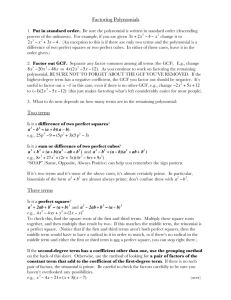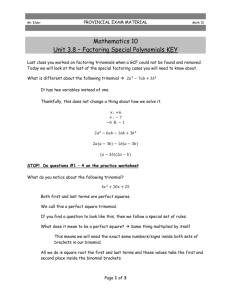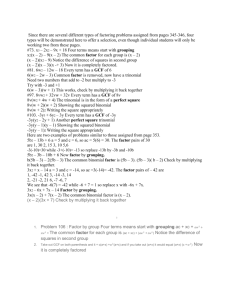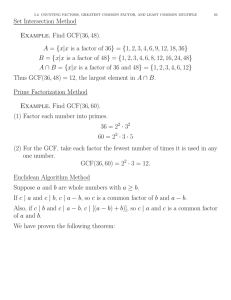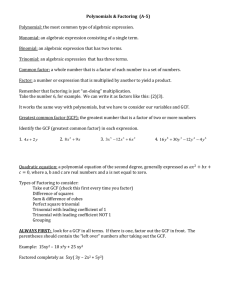7.8 Summary of Factoring
advertisement
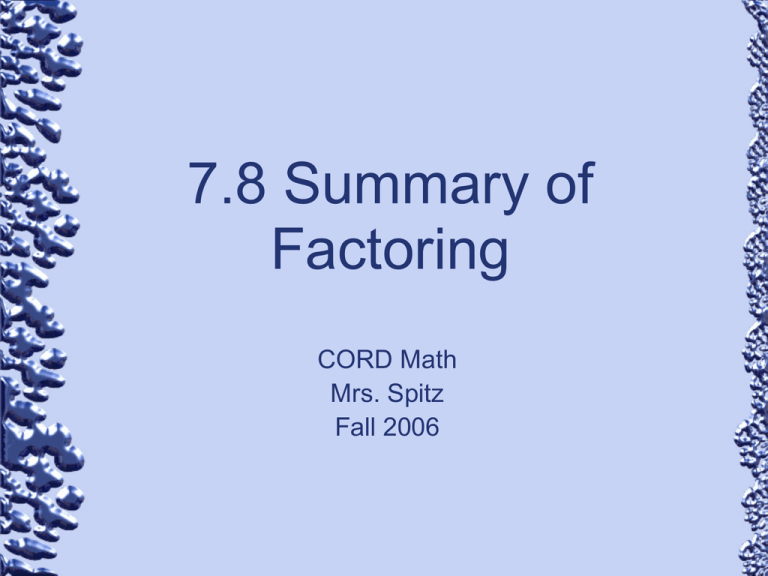
7.8 Summary of Factoring CORD Math Mrs. Spitz Fall 2006 Objective: • Factor polynomials by applying various methods of factoring. Assignment • Pg. 288 #5-50 all Introduction • In this chapter, you have used various methods to factor different types of polynomials. The following chart on the next slide summarizes these methods and can help you decide when to use a specific method. Summary Chart Check for: Greatest Common Factor Difference of squares Number of Terms Two Three Four + X X X X X Perfect Square trinomial X Trinomial w/ two binomial factors X Pairs of terms w/ common monomial factor X Watch . . . • Whenever there is a GCF other than 1, always factor it out first. Then check the appropriate factoring methods in the order shown in the table. Use these methods to factor until all of the factors are prime. Ex. 1: Factor 2 3x - 27 • First check for a GCF. Then since there are two terms, check for the difference of squares. 3x 27 2 3( x 9) 2 3( x 3)( x 3) 3 is the GCF x2 – 9 is the difference of squares since x x = x2 and 3 3 = 9 • Thus 3x2 – 27 is completely factored as 3(x +3)(x – 3) Ex. 2: Factor • 2 9y – 58y + 49 The polynomial has three terms. So check for the following: 1. GCF – The GCF is 1 2. Perfect square trinomial – Although 9y2 = (3y)2 and 49 = (7)2, 58y ≠ 2(3y)(7). 3. Trinomial w/ two binomial factors: Are there two numbers whose product is 9 49 or 441 and whose sum is -58? Ex. 2: Factor 9y2 – 58y + 49 • You must find two numbers whose product is 9 · 49 or 441 and whose sum is -58. Factors of 441 -1, -441 -3, -147 -7, -63 -9, -49 -21, -21 Sum of factors -1 + -441=-442 -3 + -147=-150 -7 + -63 = -70 -9 + -49 = -58 -21 + -21 = -42 Ex. 2: Factor • • 2 9y – 58y + 49 Trinomial w/ two binomial factors: Are there two numbers whose product is 9 49 or 441 and whose sum is -58? YES, the product of -9 and -49 is 441 and their sum is -58. 9 1 ( y 1) 9 1 -58 -49 -9 441 49 (9 y 49) 9 (9y – 49)(y – 1) Check this by using FOIL. Ex. 3 – Factor by grouping 4m 4 n 6m 3 n 2 16m 2 n 24mn2 2mn(2m 3 3m 2 n 8m 12n) Pull GCF of 2mn 2mn[( 2m 3 3m 2 n) (8m 12n)] Group two commons together 2mn[m 2 (2m 3n) 4(2m 3n)] 2mn[( m 2 4)( 2m 3n)] Pull m2 out of first group and -4 out of 2nd group. Recognize Difference of squares 2mn[( m 2)( m 2)( 2m 3n)] Factor remaining and simplify. You can check this by multiplying the factors. Chalkboard examples #1 • Factor 5ax2 – 45a 5ax 45a 2 5a( x 9) 2 5a( x 3)( x 3) Chalkboard examples #2 • Factor 32x3 – 50x 32 x 50 x 3 2 x( x 25) 2 2 x( x 5)( x 5) Chalkboard examples #3 • Factor x4 + x3 – 12x2 x x 12 x 4 3 2 x ( x x 12) 2 2 x ( x 4)( x 3) 2 GCF of x2 Factors of -12 that subtract to give you 1. Chalkboard examples #4 • Factor 12a3 – 16a2 – 16a 12a 16a 16a 3 2 4a(3a 4a 4) 2 4a(3a 2)( a 2) GCF of x2 Factors of -12 that subtract to give you -4. CB ex. 4: Factor • • 2 3a – 4a – 4 Trinomial w/ two binomial factors: Are there two numbers whose product is 3 -4 or -12 and whose sum is -4? YES, the product of -6 and 2 is -12 and their sum is -4. 6 2 ( a 2) 3 1 -4 +2 -6 -12 2 (3a 2) 3 (a - 2)(3a + 2) Check this by using FOIL.
